
Esta resenha pode conter spoilers
Bride for Rent drags out a number of tropes and scatters them about the drama. If you don’t look too deeply it’s a sweet romcom. Dig a little deeper and it unearths one of the more dangerous romantic tropes. Rocco is turning 25 and under the impression he will receive his trust from his grandmother. He’s a jerk to the women he dates and dictatorial to his buddies whom he has gone into business with. Grandma has been watching and throws a marriage clause into the trust. Regardless of the money he will come into none of his ex-girlfriends will marry him because of the way he had treated them. Along comes impoverished actress Rocky and he hires her to pretend to be married to him.
There’s a reason Rocky doesn’t make much money acting, she’s simply not very good. I’m not sure if that was in the script or a flaw on the real actress’ part. Grandma insists on a church wedding and Rocky balks. Grandma takes her aside and tells her it will be a fake church wedding but she needs Rocco to grow up and learn to love and trust again and be kind again and Rocky is just the person to teach him. At this point the forced cohabitation high jinks begin.
I was able to play along with the jerky playboy wanting to put one over on grandma so that he’d get his money. I had a harder time with the concept of a man being completely changed by a woman. Too many women believe that tired trope and have butted their bloody head against a wall trying to make an unkind man kind.
Most of the cast were capable enough actors with the exception of the female lead. When she was calm she was a pleasure to watch. Too often she came across like she’d had too much coffee with too much sugar and artificial colors.
As long as you don’t fall like Rocky did for the “you can fix a jerky playboy” trope and can look over her overly enthusiastic performance it’s almost watchable. Even the actor who played Rocco looked liked he would rather be somewhere else on several occasions.
12/8/22
Esta resenha foi útil para você?
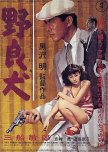
Esta resenha pode conter spoilers
Misfortune makes or breaks you
Misfortune makes or breaks you, depending on the choices you make. Kurosawa takes on postwar Japan's class divide and poverty and the choices people have to make in the face of destitution. Mifune Toshiro and Shimura Takashi star in one of the first buddy cop movies of all time. Mifune as the beleaguered rookie and Shimura as the smooth mentor made a great partnership.The plot stems from rookie Murakami's service revolver being pickpocketed on a crowded bus. He feels responsible and despondent over its loss. His supervisor refuses to let him give into despair and ultimately teams him up with the experienced Sato. His gun is used in several crimes causing him greater grief as the crimes and violence intensify. This is no brainless, violent cops and robbers film. Kurosawa gives the faceless villain, Yusa, humanity even with the bad things he's done through the witness of other characters. The problems of rampant poverty and crime are highlighted as well as the problems soldiers coming home from the war faced. Murakami and Sato do old fashioned detective work, following the clues and often waiting and being persistent. Kurasawa even has the detectives track a Yakuza at a filled to capacity baseball game where they have to put the welfare of the crowd over their own goals.
I hesitate to write too much about the story after trying and ending up with three pages which hit my editing floor. This was a beautifully made film with amazing framing and compositions. Kurosawa wasn't afraid to linger over shots, especially when they were gloriously put together. Nakai Asakazu did a stunning job with the cinematography. The lighting was especially complex in many shots. There was masterful work going on with this film.
Tokyo was in the middle of not only a crime wave but also a heat wave and you could almost feel the sweat streaming down the characters' backs. As the film nears the culmination the clouds darken and the torrential rain that breaks through also symbolizes the unleashing of the greatest brutality the characters would face as they finally come upon their quarry.
At one point in the movie, Sato and Murakami have a deep conversation at Sato's house. Sato sees Yusa as simply a bad guy who must be caught. Murakami sees himself in Yusa. They both came home from the war only to have their knapsacks stolen on a train. Yusa chose to become bitter and turn to crime, Murakami chose to work on the problem by becoming a policeman. “They say there’s no such thing as a ‘bad man,’ only bad situations,” Murakami said. Sato reminds him of all the damaged sheep left in the wolf's path. A peek at Sato's children sleeping reminds the viewer that children represented the future of Japan, pure and vulnerable who would face their own choices. Would they give into materialism and crime or take the more honorable path?
A scene with Yusa's girlfriend, Harumi, and her mother showed the differences in the generations. Her mother dressed in the wartime austere clothes while Harumi dressed in a far more decorative dress. When the reason Yusa needed the gun to begin with comes to light it highlights the great gap between the classes and how a dress in a window could cause deep seated resentment.
Mifune Toshiro gave a performance that reached several octaves. Always a live wire, you could see his energy coiled and unleashed on occasions as he dealt with the anguish of his gun being used in crimes. He was the perfect Kurosawa hero, tortured and honorable. When he finally faces his alter ego with 3 bullets left in the chamber and a vicious fight takes place, leaving us to wonder who is who, we are reminded not only of their similarities but also the differences in the choices they made. Shimura Takashi was the levelheaded mentor who saw through people and picked up on clues while his pupil was wrapped up in his own head and feelings at times. He gave an incredibly cool performance as the mature detective who knew he could often get what he wanted with honey and smooth words.
The only drawback for me was a lengthy 8-minute part of the film when Murakami goes undercover in the black market for a few days trying to find someone to buy a gun from. Honda Ishiro (Godzilla) followed Mifune around with a hidden camera discreetly filming the homeless and people selling and trading in the market. At one time Tokyo had 60,000 black market vendors. Even during the war people had to use them to find food and clothes. Like a bamboo, people would sell layers of clothes and personal items to get what they needed. After the war people were starving, some to death. He also showed some of the burned-out buildings leftover from the bombings. Though people were dependent on the black market to survive it also bred the Yakuza with gangs having their own territories. Kurosawa apparently had a difficult time leaving much of this footage out, but it felt like it would have been more meaningful if he had culled it down. Japan's economic recovery wasn't far away so this was an historical time capsule of how the people had to live which I appreciated being able to see even if I wish he'd edited it more.
I could talk about his film at length but will leave you with this. The film discussed pertinent social dilemmas and existential questions. The acting was skillful and artfully balanced. The frames, lighting, sets, and composition were skillfully done. It could be slow in places, but Kurosawa also knew when to hit the accelerator and when to brake, when to ramp up the tension and when to take a breath. If you are prepared to be patient when the movie slows and lingers, I can easily recommend this gem.
10/7/22
Esta resenha foi útil para você?
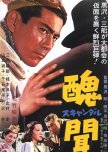
Esta resenha pode conter spoilers
"If you don't let what's in your heart out, you'll choke on it"
Kurosawa calls upon his characters to stand up for what's right even if the odds are against them in Scandal. Honor, weakness, redemption, and a rebel painter on a motorcycle all figure into this film.A young, handsome Mifune Toshiro played the painter Aoye Ichiro who rebelliously road his motorcycle everywhere. When he offered a beautiful singer, Shirley Yamaguchi as Saijo, a ride back to her hotel in the mountains where he was also staying, the dominoes were stacked. The paparazzi had followed her to the hotel where she refused to have any pictures taken. In a genuinely chaste moment, the two were photographed together in what could have looked like an intimate scene. The tabloid wrote a salacious story about the two having a romantic getaway which went viral in a 1950's manner. When one of the photographers asked if it was okay to write a false story, the boss told him, "It doesn't matter if it's true. Once it's in print the public believes it." And therein lies one of Kurosawa's themes-the unscrupulous press who valued sales over truth and a gullible public who would believe it.
Ichiro decided to sue the magazine for the trouble brought down on himself and Saijo. Another theme-understanding the difference between right and wrong and standing up for what was right regardless of the consequences. In stumbled Hiruta Otokichi (Shimura Takashi) a lawyer begging for the job of representing him and the story became something else. Ichiro decided to hire Hiruta after meeting his tuberculosis bedridden daughter, a purity of love and light. The story now became focused on Hiruta's weakness. Weakness for money, betting, drinking, and in general doing all the things he considered loathsome...including selling out his client. Another theme-the disintegration of the ability to tell the difference between right and wrong in post war Japan. The film also began to center on Hiruta's weaknesses more than the court case and the gradual road to his redemption guided by his daughter and a motorcycle riding artist.
There were times in this film I thought I was watching a version of It's a Wonderful Life only with a down and dirty Clarence. It felt Capraesque in several places. For a Kurosawa film it was more sentimental and predictable than I would have thought. The shift from the story focusing on Mifune and Yamaguchi to Shimura's character was jarring. I normally enjoy Shimura's performances, but his hang dog, self-castigation went on too long for me. He would perfect this "poor me" performance for Ikiru. Fortunately, there were some lighter moments to break up all of his self-recriminations. As lovely as they were, Ichiro and Saijo came across rather one note and too perfect. Even with his habit of gunning his motorcycle and painting nudes, Ichiro practically squeaked when he walked, he was so clean and honorable.
The harsh commentary on the tabloids, moral disintegration, and the judicial system was not subtle. There was the obvious lament that while the fake news stories sold in the tens of thousands, Ichiro had trouble selling his actual works of art. Ultimately, the focus became about Hiruta's weaknesses without condemning them, simply exploring them and his reasons for them. Finally, watching as his lifeline was assembled, one that in the end might condemn him but set him free at the same time was worth rooting for. It takes a lot of courage to become a shining star reflected in a polluted pool of water.
I enjoyed this film, but not as much as I hoped I would. It was definitely worth watching for seeing Mifune Toshiro transporting a decorated Christmas tree on the back of his motorbike.
10/5/22
Esta resenha foi útil para você?
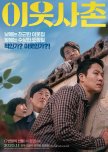
Esta resenha pode conter spoilers
Sometimes you have to risk all to have a safer and better life
When you open up your mind, you never know where you will meet your Best Friend. Set in the tumultuous 1980's in Korea, this film was very loosely based on real events and presidential candidate and activist Kim Dae Jung.During a time of martial law, student protests, brutal interrogations and arrests, Lee Ui Sik finds himself and his family under house arrest for being in opposition to the ruling power. As the intelligence chief states, anyone not like himself is a "commie" and "commies" are detained, or deported, or killed. The chief calls upon Dae Kwon, a part-time patriotic helper, to move in next to the Presidential candidate, Lee Ui Sik and his family, who are serving under house imprisonment and surveil them. The goal is to prove Lee is a commie with ties to North Korea and finally rid themselves of him. Through a series of comic adventures, Dae Kwon and Lee meet, even ending up in a bathhouse with Lee's son. Though on opposite sides, both men are lonely and in need of friendship. The more Dae Kwon listens in on the upright Lee and the more he sees how the current government covers up its own dirty work, he slowly begins to change his mind and his ideas.
Like many Korean movies, Best Friend's mood changed on a dime and went from comedy to tragedy, back to comedy and a host of other emotions. Some of it worked and some of it didn't. It could be uneven and even jarring at times, but it was never boring. Veteran actor Kim Byung Chul as Dae Kwon's assistant was the catalyst for many of the laughs. Lee's family played it dramatically straight for much of the movie. Though a few scenes went fully into melodramatic territory, the final act revealed the dangers of attempting to change a corrupt regime.
Jung Woo gave a complex performance having to work both the comedy and melodramatic beats of the film. Dae Kwon not only dealt with spying on his neighbor, but he was also a husband and dad and not a very good one. Through his clandestine observations, Jung Woo shows Dae Kwon's epiphanies as old beliefs and habits make way for new ones. Scandal plagued Oh Dal Soo was fine as the beleaguered candidate having to make decisions even as he faced personal crises and death threats.
I have to give Korea points for being willing to look at difficult times in their history and work through them artistically. Though a fictional work, bordering on fantasy at times, Best Friend did push forth the idea that in order to change society even when it might come at great personal cost, it had to be done for the good of all and future generations.
With the themes of enemies to friendship, sacrifice for the greater good, and personal evolution, Best Friend, if not inspiring, could be funny, entertaining and even heartwarming. Not a perfect film, it was too erratic and sometimes heavy-handed, but one worth trying sometime. (7.75)
8/24/22
Esta resenha foi útil para você?

Esta resenha pode conter spoilers
The Monkey King 2 takes place 500 years after the Havoc in Heaven, a sequel to The Monkey King starring Donnie Yen. In this film Aaron Kwok plays the hairy hero to good effect. The Monkey King 2 boasts a strong cast with Feng Shao Feng as a righteous monk and Gong Li as a deadly and deadly alluring demon. The story didn't always serve them well but it was entertaining. When a bumbling monk accidentally unleashes the Monkey King, Sun Wu Kong is given the task by the goddess of accompanying the monk to a temple and retrieving some holy scriptures. If he accomplishes the task his binding golden crown will be removed. Standing in their way is the White Bone Demon played to perfection by the ethereal Gong Li. She has several creepy demons to help her and if you have a fear of snakes, best to avoid this movie or use the fast forward button in some scenes. Another triggering thing is the death of children and torturing of children, let the viewer beware.
This version of the Monkey King is the most understated I have seen, and to be honest a relief. Some actors take their monkey performance over the top. Maybe all those years trapped in the Five Elements Mountain gave Wu Kong time to reflect. I quite enjoyed Kwok's performance which was emotionally compelling even through the hair and makeup. Sheng's monk could be overly righteous at times but did bring up the ethics of killing even when it meant self-preservation.
The side-kicks weren't fully developed though Pigsy did give some comic relief. And the big blue guy, Sand Demon Sha Wujing got to show his stuff in a battle with a near endless supply of skeleton warriors. As I've stated previously Gong Li made the White Bone Demon a formidable and believably malevolent villainess.
Sammo Hung choreographed the fight scenes and the high flying fighting was right up his alley. This was wire-fu on steroids but also quite fun and visually interesting. When dealing with an array of demons and other supernatural characters in a fantasy film the super-powered fighting made sense.
The sets, costumes, and CGI were all top notch. The final battle was creative and something to behold. The drawbacks for me, were some lulls in the story and an ending scene that put the onus on the Monkey King to kill when throughout the entire movie, the righteous monk had berated him for killing even to save lives. I enjoyed this Monkey King more than most in this genre, even with its flaws it was an entertaining movie.
Esta resenha foi útil para você?
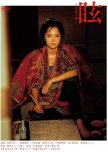
Esta resenha pode conter spoilers
The shadow shapes everything. The light illuminates it.
The current synopsis tells the entire story of the special on Katsushika Oi so I won’t go much into the story for this review. I wanted to write something to highlight this interesting special to draw attention to it.Oi and her famous father, Katsushika Hokusai, are at the center of this special. Though their relationship isn’t delved into very deeply it does show some of the conflict and comradery between them. Two artists obsessed with becoming better, letting everything else fall by the wayside. Along with their artistic disciplines there was a glimpse into their domestic habits. Neither cooked or cleaned, moving when the place became too cluttered.
The more Oi observed the world, the more interested she became in vibrant colors and the play of light and shadow. A fire could give her inspiration for creating new colors to work with. How much of Hokusai’s work she contributed to, especially after his stroke and/or palsy, may never be known, but her work can be seen in some of his. The ten surviving paintings directly attributed to her show a stunning use of color and shadow and also a different perspective than was often displayed at the time. This special attempts to understand her thinking as she worked through her own artistic beliefs and style.
The production values were quite good. The sets, costumes, and music all helped this viewer become emersed in the artists’ world. Miyazaki Aoi gave a wonderful performance as the daughter as consumed with painting as her famous father. Nagatsuka Kyozo’s portrayal of the wild haired artist and father was also quite good. Matsuda Ryuhei gave a nice turn in the supporting role of Keisai Eisen, an artist with whom Oi has a flirtatious friendship. It would have been more interesting for me if they could have gone deeper into what it would have been like for a single woman of advancing years staying unmarried and working as an artist with her father. All in all, as a brief look at Oi’s life and work, I found it educational and entertaining. I thought they did a good job of not making it about the more famous men in her life and giving her own artistic journey the proper attention. Even so, Oi may have been the focus of the film, her story couldn’t be told without her father. Until a light was illuminated on her own significant talent she worked in his shadow. Fortunately, a light did find the colorful storytelling in her own paintings.
Esta resenha foi útil para você?
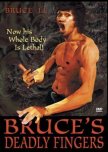
What drew me to the movie was the cast---Lo Lieh, Nora Miao, Michael Chan, a host of famous kung fu stuntmen, and Bolo even makes a guest appearance! Bruce Le was not playing Bruce Lee, his character's name was Bruce Wong, but he tried to duplicate some of THE Bruce Lee's mannerisms which came across as laughable.
Bruce Wong was trying to find Bruce Lee's secrety secret Kung Fu Finger Book which had been entrusted to his sifu. Lo Lieh, playing the Big Bad Lee Hung, was after it as well. There you go, that's the plot. Bruce Wong's sister and ex-girlfriend were kidnapped three times. Did they get their frequent kidnapping card punched each time? There was gratuitous nudity, one scene had a naked woman being threatened with a snake. Those scenes pandering to fifteen-year-old boys dropped my rating to a 1. I gave it a 1 point bump for Lo Lieh and Bolo.
The fight scenes were actually pretty good, especially the ones Bruce Le wasn't in. Wong's buddy and an Interpol agent spent a great deal of time fighting each other and the baddies as well. The strong bit part players lent to some good fights. The nunchuck work, however, like Le's Bruce Lee mannerisms should have been omitted.
The problem the director and writer had was they didn't know what to do in between fights or how to develop anything that resembled a coherent story. Let's kidnap and threaten the women again! Show some boobs! Let's have a shot of someone walking down the street or down a hallway! How about watching someone drive a car or play cards? How about two people watching television? Should we have them say anything that would be considered plot or character development? What's that?
This might have been a watchable movie if Bruce Le hadn't tried to look like and act like Bruce Lee. All he managed to do was remind me how charismatic the original was. Michael Chan seemed to be channeling his inner Bruce, too. It might have been a watchable movie if the women hadn't been there to be objectified and tormented. They didn't need the women as bait because the "good" guys were always looking for a fight anyway. This movie had a strong kung fu cast, with good fights, and a magic kung fu book, everything a kung fu movie needs. Too bad the filmmakers took the low road into exploitation.
Esta resenha foi útil para você?
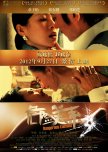
Esta resenha pode conter spoilers
A remake of Dangerous Liaisons made with an international cast of Hong Kong, Taiwanese, Chinese, Korean, and American actors. If this is the first version of this story you've ever seen, you might be far more impressed than I was.What I liked about this movie: The cinematography was lush and the scenes were wrapped in golden light and settings. 1930's Shanghai came to life beautifully.
What didn't work for me: Mostly the acting and the reworked story. Cecilia Cheung played the Marquise de Merteuil/Madam Mo Jie Yu role. This is a key role, she was the independent, manipulative, devious mind pulling the strings in business, society, and the bedroom. She should have been the alluring lethal danger in this movie. Unfortunately, instead of displaying the cunning and cruelty at the heart of Jie Yu, Cecilia could only manage a fake smile and a grimace occasionally, bringing almost no nuance to this multi-layered character.
Jang Dong Gun in the Vicomte de Valmont /Xie Yi Fan role was pleasing enough but lacked the sexually sinister side needed as Valmont/Fan slept his way across Shanghai and ultimately tripped himself up by falling in love. Zhang Zi Yi portrayed the Madame de Tourvel/Madam Du Fen Yu role. Her performance was perhaps the most disappointing, and I'm a fan of hers. Somehow, they transformed her into a frumpy woman, a woman who moved and dressed like an elderly little old lady. A reserved character became almost lifeless in her hands, and it was hard to understand how Fan fell so hopelessly in love with her.
The secondary younger characters, integral to the story were given short shrift and much of their important action was done offstage.
Key parts of the original story were cut out or given to other characters. Sometimes a new vision works, this retelling of the tale did not for me. Again, if you've never seen other versions of this, this interpretation may be perfectly serviceable.
Most unsatisfactorily of all, they took the bite, rancor, revenge, and tragedy out of the ending. This cast lured me into watching yet another version of this story, bitterly disappointing me in the end. Jang Dong Gun's charisma did lift an otherwise limp version of this sexual and power games movie, but his performance wasn't enough to save it for me. Instead of Dangerous Liaisons it was more like Irksome Liaisons.
Esta resenha foi útil para você?
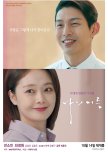
Dumplings anyone?
The Name is a heartwarming and bittersweet love story built on longings and lies.Ri Ae offers Cheol Woo a small fortune for him to create 20 paintings and let her sign her name to them for an art exhibit. Living in what amounts to an artistic coffin in the park, Cheol Woo ultimately, if not reluctantly, agrees to being a ghost painter. Of course, not all is what it seems with the two characters.
The Name's plot is quite simplistic, with well used tropes and twists that can be seen from a mile/km away. The characters have some growth, but little depth. Cheol Woo's supposedly ground breaking artistic style peaked quite awhile back in the real world, but I understand they needed art for the displays.
Romantic movies whether comedy or tragedy succeed or fail on the chemistry of the leads, something The Name succeeded with for the most part. Jeon So Min gave a nice but not overly wrought performance as a woman with a complicated relationship with her mother, who was dealing with her own health concerns, and living with unrealized dreams. Choi Jung Won gave a charming turn as the down on his luck but rarely down in his mood artist whose success was just always out of reach. The remaining cast give perfunctory if not inspired performances.
If you are looking for something new and innovative, this is not it, unless you haven't watched many dramas. If you are looking for a comfortable, familiar romance with two likable actors this is just the ticket.
Esta resenha foi útil para você?
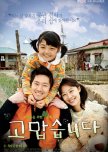
Esta resenha pode conter spoilers
An old school drama that dealt with AIDS, dementia, redemption, and single parenthood in a thoughtful and compelling manner.I loved how this drama did not back away from confronting the stigma HIV/AIDS patients face, especially nearly two decades ago. Once the little girl's situation was brought out into the open, the drama used each episode as a teachable moment not just for the characters, but the audience as well. The scope of her disease was narrowed down for drama purposes but I'm glad they showed how people afflicted with AIDS need support and not ostracization.
Seo Shin Ae, as little Bom, won my heart with her performance. She moved from tears, to laughter, to precocious behavior seamlessly. She was a joy to watch.
Jang Hyuk gave a stellar performance as the closed off doctor who found redemption and peace on a small island. A family of misfits washed him as clean as the shore after the waves recede-a single mother, a daughter with AIDS, and a father with dementia in a remote community was not where this ill tempered doctor ever thought he would wind up. Throughout the drama Jang Hyuk allowed us to feel Min Ki Seo's contempt, his sorrow, his compassion, and his reluctant love developing.
The drawback for me was Gong Hyo Jin's performance. Most of the characters grew and changed, all except her Lee Young Shin. Hyo Jin excels at playing self-sacrificing doormats, but aside from a few smiles with Bom, her performance was rather one note. The writers were at fault as well, they never fully developed this matriarch of misfits. Up until the very end of this drama, I never understood her, never saw a glimmer of affection for the man they told us she was falling in love with. Her mumbling, stumbling, head down performance and frozen expression took away from the emotional depth of this drama. It was hard to hope for a relationship to develop between Min Ki Seo and this woman who could not crack her heart open long enough to share a part of herself with him.
I enjoyed this drama overall and would have loved it more if the writers and actress had let us watch Lee Young Shin grow and blossom, learn to stand up for herself and her daughter, and bask in the love of the imperfect but dedicated man who fought to stand beside her. As it was, I found Min's and Bom's First Guardian Angel and Angel friendship much more heartwarming and engaging.
Esta resenha foi útil para você?
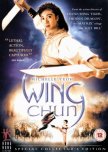
Michelle Yeoh was amazing as the young woman, Wing Chun, who had escaped a forced marriage and gone to study martial arts for years. Upon returning home and setting up a tofu shop she was often the wall between the townspeople and roving bandits. Michelle did nearly all of her own stunt work and truly shone brightly in this role.
Donnie Yen played Leung Pok To, Wing Chun’s childhood friend, who had returned after several years away to ask for her hand in marriage. He didn’t recognize her as she was dressed as a man and mistakenly thought the pretty young widow who worked in Wing’s tofu shop was her. Suitors competed for the women and there was some good-natured bed hopping. There was a love triangle, or maybe square, on second thought it might have been a love heptagon.
Donnie was as cute as a puppy in his role as Wing Chun’s would-be suitor. Leung was skilled in martial arts but not as accomplished as his childhood love. Norman Chu seemed to have a good time playing the Bandit King, he made a brash and comical villain. He couldn’t decide if he wanted to beat Wing Chun or marry her. The side characters were interesting and distinguishable--the money counting and intimidating sister who had eyes on a scholar, the scholar who was torn between Wing Chun and the young widow, the young widow who was in need of a man’s, uh, services, and a bandit who wanted the widow as his wife--all helped fill out the story in a meaningful way.
I liked this movie because unlike a lot of kung fu movies the romances weren’t tacked on and were relevant to the plot. These were all people trying to earn their happily ever afters in between kung fu fights, of course.
Yuen Woo Ping outdid himself with the creative fights, one particularly clever fight between Wing Chun, a hired fighter, and a plate of tofu was ingenious. There were no deaths or blood-soaked bodies, just lots of high wire, good old-fashioned fights with people who knew what they were doing. The action was fast, stunningly choreographed, and well-acted at the same time. Though some parts of the fights were unrealistic, who cares when they were so entertaining.
Importantly, they stuck the landing. I loved the final fight between Wing Chun and the Bandit King. I’ve never seen fight scenes quite like the ones shot for this film. The culmination of it was perfect. They also made me laugh. This film made me laugh several times and I rarely if ever laugh at “funny” kung fu movies. This was not a perfect film and some parts of it were dated. Regardless of its flaws, I enjoyed it.
Michelle and Donnie are two of my favorite actors and this film was a dream team for me complete with romance and spectacular fights. If you enjoy kung fu movies, this one is well worth seeking out.
Esta resenha foi útil para você?

Xuan Zang set out for India, when it was forbidden to leave the country, in order to bring copies of more accurate Buddhist scriptures home. Reason, laws, and the threat of death could not deter him from his holy quest.
The cinematography was extraordinary and a treat for the eyes as Xuan traveled through both cities and desert wilderness, often alone. Varying from lush green to desolate sand and stone, and later snow capped mountains, the scenery was breath-taking. Ancient ruins, temples, and shrines are visited. Often the scenery showed him barely visible, a tiny monk making his way through a vast and sacred world. The music fit with the mood perfectly.
This is a slow, reflective film as Xuan's faith meets up against disappointment and hardship. Living in a time when I can find information with the push of a button, I'm in awe of someone who was willing to risk death, imprisonment, starvation, and thirst to increase his knowledge and faith and then the overwhelming desire to bring it back home again to share. His journey took between 16 and 19 years depending on the source and he covered over 25,000 km (15,534 miles). This film gives a glimpse of what he accomplished, the people he met, the effect he had on others, and the joy the scriptures brought to him. There are a couple of narrative hiccoughs when an inexplicable time and place jump occur, but that's a rarity, and a small quibble. The censor's heavy hand causes a few shadows as well. For the most part this is a film to soothe the eyes, ears, and soul. Every moment and person is treated as holy and a gift. It may be the idealized version of his life but it was a pleasure to sink into it and let the beauty of the colors and notes and love for all life wash over me.
Esta resenha foi útil para você?

The movie starts with miners being violently killed in a dark, flooded cave. It is creepy and claustrophobic. Up out of the ground come giant killer dragonfly larvae. Much of the first part of the film is people hunting them down and attempting to kill them. Little did they know that what eats the giant insects was going to be more problematic-like letting a tiger in the back door to chase the wolves away at the front door.
Rodan was much more impressive in this movie than subsequent ones. He was huge, mobile, and destructive. Yes, you can see the wires at times if you look closely, but this old movie did quite a bit with the special effects and budget they had available to them. The miniatures were exquisite. Honda Ishiro and Ifukube Akira did a good job of bringing a giant flying dinosaur to life and making us care about him when by all rights we shouldn't.
Many times the human aspect of these movies fails. This time there was a sense of urgency and pathos from the beginning to the end. It also helped that this movie came before subsequent campy monster romps. As with Godzilla, by the end of the movie, even the human characters begin to feel sympathy for the great beasts.
Though around 65 years old I thought Rodan held up pretty well. He's now in my top three early Toho movies.
Esta resenha foi útil para você?
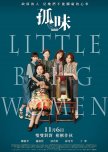
For me there were too many characters and too many conflicts to fully connect with many of the characters. I enjoyed it but I didn't love it and likely would not visit this group of dysfunctional people again. Bittersweet and heart-warming at the same time, Big Little Women at least gave us a largely female cast and shined a light on the complicated female relationships and strengths within a family.
Esta resenha foi útil para você?
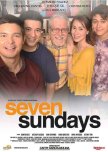
Esta resenha pode conter spoilers
This is my first Filipino movie and I really enjoyed it. It's the story of a family that drifted apart after the mother died years ago.The story begins with the father of four grown children spending his birthday alone because his children are too focused on their own lives and problems to visit. On the day of his unattended party his receives news that he has cancer and only 7 weeks to live. He sends a text to his children to inform them of the news.
The eldest son took over the family store and is on the verge of bankruptcy. The second son became wealthy and successful but believes his family only likes him for his money. The daughter has three children with a philandering husband. The youngest child felt abandoned after the mother died and his siblings moved away and is now in legal trouble.
The children decide to come together on a Sunday and throw him a surprise birthday party, but old wounds flare up and arguments explode. After learning of their father's distress over their squabbles, the children agree to get along for his sake and to meet every Sunday at his house. Each Sunday the family comes together on various adventures and learn about each other in the process.
There are ups and downs in the story as wounds and secrets are revealed and healed.
I don't want to spoil the secrets, but I will say that this is not a downer or tragedy. This movie is the definition of heart-warming.
I can recommend this movie with a happy heart.
Esta resenha foi útil para você?

 55
55 202
202 11
11






















